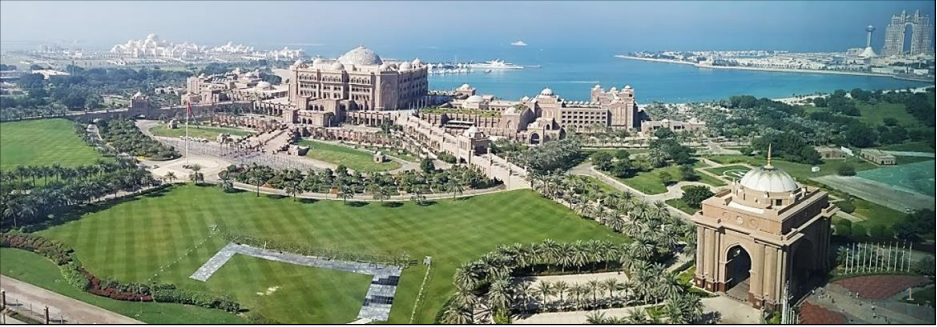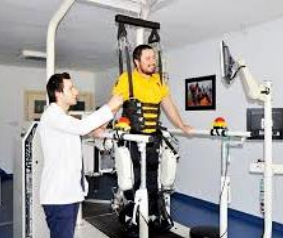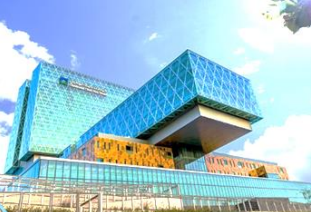Cultural Issues in the UAE & How They Impact Health Care: Lessons From Abroad Part 2
In my last article (April, 2018) I introduced this series “Lessons from Abroad” and provided an overview of the United Arab Emirates (UAE).
In my introduction of that first article, I stated “The saying ‘We are all different, We are all the same’ is true on many levels. It is my hope that readers try to not focus on the fact that the UAE is half way around the world but rather part of their world which they have not yet explored.”
As I discuss cultural issues in this article, it is important that our readers keep an open mind. I am still learning the culture and appreciating nuances as well as gaining some understanding behind some of those issues that are very different from how I was raised. I remind myself that, in a very real sense, I am a guest and so I try not to judge. I observe and try to understand. In doing so, I have learned more about myself and why I behave the way I do, I hope the same will be true for you as you read this article.
Before discussing some of my “odd” observations from the UAE, I thought I would focus on one of the most impressive and heartwarming aspects of the UAE. One of my first cultural experiences was the very deep level of hospitality in the Arab world. This dates back to biblical times and can still be felt today. Banks, offices and hospital waiting rooms greet clients with ornate Arabic coffee sets and a dish of dates. My first trip to the Camel Festival was initially very uncomfortable because my family and I were clearly the only non-Arabs in sight. We all had concerns that perhaps we shouldn’t be there. Within minutes we were greeted by an Emirati hostess who spoke perfect English and walked with us throughout the festival including camel rides, VIP treatment at the hospitality tent and pictures of my sons and I in traditional dress. No cost, no strings – just hospitality towards those who were clearly guests to the UAE. This hospitality no doubt was passed down from Bedouin ancestors who relied on hospitality to survive when traveling in a harsh desert. It has spread to expatriates in Abu Dhabi who are far from home and have all had to deal with being “alone” in a new place.
When I came to Abu Dhabi, my boss (the Chief Medical Officer) not only put me up for a month in his home but loaned me several thousand Dirhams (UAE currency) because it takes weeks to open a bank account. It turns out that his first boss did the same for him when he came from Kentucky. The thought occurred to me that people in need support each other including in healthcare (PA Polio Network being a prime example). My wife has a wonderful gift of hospitality. If I’m honest, I don’t have that natural inclination. When things get tough, I have a natural tendency to want to be alone and separate myself. I think we all have some of both of these qualities and it is clear to me that working towards connectedness, and avoiding a tendency towards separation, is an important goal in healthcare.
Although I have been in Abu Dhabi six months, I saw very few patients until our outpatient facility opened two weeks ago. Even now, I see only a few patients since my focus is our inpatient rehabilitation hospital opening in December. Despite a lack of volume, I do have several observations to share. Many of these include significant contradictions that likely stems from the fact that there has been such dramatic Western influence in the past 50 years but still a strong sense of tradition.
Smile and Nod: In the Arab world, people do not contradict those they respect or those in authority. Unfortunately, this includes physicians. As a consequence, it is easy to get a “smile and nod” to recommendations that are either not understood or that a patient disagrees with (but won’t say so). I have been trying hard to foster deeper levels of discussion by putting the control in the patient’s hands (my mantra is “I give advice; you make decisions”). My success has been variable.
Enshala: In my office, I often try to engage spirituality while avoiding religious discussion. In the US, religion is a bit of a taboo topic with people you don’t know well. In the UAE, religion is pervasive regardless of an individual’s personal spirituality. Case in point is the word “Enshala” which means “God willing”. One hears this many many times a day in the most routine conversations. It can be a heartwarming acknowledgement that we are not in control of the world. At the same time, others use it as a way to shirk personal responsibility (think employee who is being asked for the third time to get something done and says “Enshala, this afternoon” but really there is no intention of doing it today). Anyone who knows me can understand I struggle with this, especially in patient care. To me, taking personal responsibility for our current situation is the foundation of creating a plan to move to a new place. Acknowledging God has a plan does not equate with waiting for a miracle. I have seen miracles occur many times, most frequently when God moves us in a special way to do things we didn’t think we could.
Doctor Shopping: This is seen at levels that are unreal here. Emirates will sometimes go from one doc to the next looking for more opinions. In complex cases, this might involve trips to the US, Germany or elsewhere that are paid by the government. As a result, patients often bounce around without a direction. This can lead to a sense of detachment from their healthcare issues – nothing makes sense because of so many opposing opinions. Thankfully, as a Board Certified US physician, I am often seen as “The Guy to see” and I am hopeful we will build a system that helps patients feel confident they are headed in a good direction. When sailing into the wind, a captain will set a diagonal direction that may not be directly where he wants to go but gets him closer. Not having a rudder just gets us beat up by the waves, I think the same is true in healthcare.
New and Expensive must be best: I’m guessing that there are more cars in the UAE made by Ferrari, Maserati, McLaren and Bentley than nearly anywhere on earth. While 50 years ago tents and camels were the norm, expectations have changed. In healthcare, this attitude dominates as well. An example would be that before I was hired, there were decisions made to have very expensive robotics devices in our hospital. Many of these expectations are, in my respectful opinion, ignorant and reflect a lack of understanding. After working in PM&R for 30 years, I can tell you that a good therapist is much more important than the equipment they work with.
Pills: This one runs the spectrum. Some are culturally wary of any medications. Pain killers are very heavily controlled and difficult to prescribe (thankfully, I generally don’t use them). Anything that might dull the senses is considered a controlled substance – even medications that I use routinely and have a low risk of this as a side effect are controlled. On the other hand, some individuals have pills as an expectation – one of my first non-English speaking patients complained to the CEO that I took too long with him and didn’t even give him a prescription (despite the fact that he never expressed this to the interpreter – see “Smile & Nod” above).
While Western culture has brought some tremendous blessings to the UAE, this “fix it for me” mentality has been an unfortunate negative import.
While I wanted to portray some of the cultural issues in the UAE that limit health care delivery, I hope you have not been left with a negative impression. My wife and I have been thrilled with our adventure here. Just as with people, cultures have their good, their bad and their ugly parts. I tend to focus on the good while being aware of the not so good.
I have recently been reading The Book of Joy by The Dali Lama and Bishop Desmund Tutu. In it, the bishop repeatedly talks about the importance of forgiving ourselves for our imperfections. This allows us to embrace them and move past them. Perhaps some of you may see parts of the above cultural aspects in yourselves. If so, I hope that you will be able to reinforce the helpful and move past the not so helpful aspects of your personality that might be limiting your healthcare and wellness.



